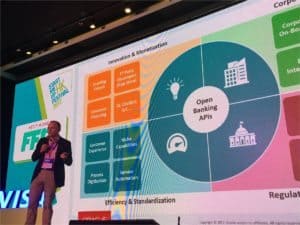
Oracle is one of the largest software and services company in the world. Only second to Microsoft, Oracle has grown and pushed into a multitude of verticals and businesses. Today much of Oracle’s business has to do with Enterprise Resource Planning (ERP) software – massive programs that facilitate and improve on all types of corporate functions. From shipping & delivery, to HR, to operations. It’s all there. But Oracle is also huge in Fintech. And it is getting bigger.
Oracle employs over 120,000 professionals around the world with deployments in 145 different countries. Via innovation and acquisition, Oracle now has a market cap of more than $175 billion; it is not a small company. And Fintech is playing an increasing role in the growth of the company.
 Oracle published a white paper last May entitled Digital Banking: Evaluating Paths for Progressive Transformation. The white paper explains:
Oracle published a white paper last May entitled Digital Banking: Evaluating Paths for Progressive Transformation. The white paper explains:
“As digital technologies continue to gain ground, it will have a profound impact on banks and how they operate. Banks will have to deal with the customer in a completely new channel created by this physical-digital convergence. In fact there may be no more channels and the customer becomes the only channel for banks to deal with – banks can now stop planning for individual channels and start planning for the customer’s journey. Beyond the changing customer, digital has given rise to a new wave of innovations that is slowly transforming the way the banking industry fundamentally operates. New players from the tech world and other industries – startups, tech giants and retailers are offering financial products and services where it is most relevant and convenient to customers.”
Oracle warns traditional finance that they are at risk of tunnel-vision: just viewing this digital transition as a cross over to mobile wallets and payments: just improving existing services is the wrong approach. Digital disruption is causing profound change in financial services. Physical branches may be no more. Oracle said doing nothing or “rip and replace” were not good options for banks. This is change that must come from the core.
Future Proofing Relevance
 Mark Atherton is leading the Fintech charge at Oracle. As Group Vice President for Financial Services at Oracle, he is in the midst of the Fintech scrum. Atherton helps to manage 10,000 employees dedicated to the financial services unit and he believes opportunity for Oracle is on the rise.
Mark Atherton is leading the Fintech charge at Oracle. As Group Vice President for Financial Services at Oracle, he is in the midst of the Fintech scrum. Atherton helps to manage 10,000 employees dedicated to the financial services unit and he believes opportunity for Oracle is on the rise.
Oracle, under the guidance of Atherton, was part of the National Australia Bank’s (NAB) tech overhaul that has been described as the largest tech transformation in the bank’s history. NAB is one of the largest banks in Australia and the implementation was characterized by NAB as how the bank is “future-proofing” its business to ensure they have the right infrastructure in place to deliver a faster and better customer experience. NAB wants to remain relevant in the digital finance world.
But it is not just about banks. Finance is fast becoming ubiquitous. And why not? Do you have to be a bank to provide credit? No, you don’t. Do you have to be a bank to provide access to money? Well, that depends.
Last week Crowdfund Insider spoke to Atherton to hear his thoughts on the emerging Fintech ecosystem and what it means for traditional finance. He explains that Fintech is not just about online lenders and updating old banks. It is about Telecom companies, retailers and more. Atherton said that Oracle can create and launch an entire digital bank in just 27 weeks. They have already done it and they plan on doing more.
Banks are Being Held Hostage to Legacy Tech
Asked if Banks are poised to get crushed, Atherton states;
“That depends on the Bank. The community banks have been narrowed down to mortgages and commercial loans. Relationships matter more but there is more paperwork. It is a long tedious process. That is one of the reasons why Fintech has attacked it. It is a pain point. They [Fintechs] are putting pressure into these banks. The community banks are at most risk … They are most vocal about resisting it. The more digital the process is, the easier it is to placate the regulator, ironically.”
 Technology makes regulation so much easier. Regulators can just plug-in and know what is going on at the firm. This heavy cost of compliance can be mitigated but smaller banks are ill-equipped to update and change. Atherton believes some community banks will survive but too many are “held-hostage” to long-term contracts with legacy software that can’t move fast enough. These banks are at risk of disappearing.
Technology makes regulation so much easier. Regulators can just plug-in and know what is going on at the firm. This heavy cost of compliance can be mitigated but smaller banks are ill-equipped to update and change. Atherton believes some community banks will survive but too many are “held-hostage” to long-term contracts with legacy software that can’t move fast enough. These banks are at risk of disappearing.
Fintechs have an advantage with both speed and regulation but the big banks have the ability to invest and streamline their processes. These large banks are now opening up the APIs to Fintechs to use their data to provide these banking services. This process is accelerating around the world. Atherton also believes that big banks have an advantage in their cost of capital – in comparison to online-only lenders.
“This stuff is going to happen. You will see unsecured personal loans in 10 minutes. In Australia, it takes them 6 days to fully fund a mortgage. They want to get that down to 6 minutes,” says Atherton. “There is no reason the US cannot do the same.”
 The US has the most convoluted regulatory approach to banking and financial services in the world. Think about it. Creating a byzantine regulatory structure that adds cost and inefficiencies to financial services, for both consumers and businesses, is an area where the US excels. Of course, the consumer always ends up footing the bill as state regulators and the dozen or so federal agencies that regulate financial services pound the table as to why they are so relevant. Oddly, this helps Oracle in their Fintech push. Their platform is compliant across ALL 50 states. Dodd-Frank reports to the Fed: no problem. Their financial services applications make reporting a “non-event.” Eventually, regulators will get it and join the Fintech movement as it makes their jobs easier.
The US has the most convoluted regulatory approach to banking and financial services in the world. Think about it. Creating a byzantine regulatory structure that adds cost and inefficiencies to financial services, for both consumers and businesses, is an area where the US excels. Of course, the consumer always ends up footing the bill as state regulators and the dozen or so federal agencies that regulate financial services pound the table as to why they are so relevant. Oddly, this helps Oracle in their Fintech push. Their platform is compliant across ALL 50 states. Dodd-Frank reports to the Fed: no problem. Their financial services applications make reporting a “non-event.” Eventually, regulators will get it and join the Fintech movement as it makes their jobs easier.
So where is this all going? Financial services are quickly becoming ubiquitous. As banks hear the footsteps of agile Fintech innovators approaching, other competitors are advancing. Atherton says that Telcos, retailers and various industry sectors are positioned to provide much of what a bank accomplish today. Oracle is already working with some of the largest wireless Telco companies to potentially provide lending. The value proposition for borrowers is pretty simple too as the Telcos already have all of your info. And if you don’t pay off your loan, they just turn off your phone. This is just the beginning.
Banks Must Ride the Digital Wave
 While Fintech firms have an advantage in flexibility and speed, Oracle wants to be the software provider of choice for firms that need to adapt or simply are seeking to provide new financial services. They are investing around $5.5 billion each year to accomplish this goal.
While Fintech firms have an advantage in flexibility and speed, Oracle wants to be the software provider of choice for firms that need to adapt or simply are seeking to provide new financial services. They are investing around $5.5 billion each year to accomplish this goal.
“The cost of regulation is so high because of the paper involved,” states Atherton. “Fintechs have an advantage because they are all digital. The regulators are going to start to understand this. The cost of regulation is coming down… traditional finance needs these new capabilities, otherwise they will be massively challenged … this stuff is going to happen…”

